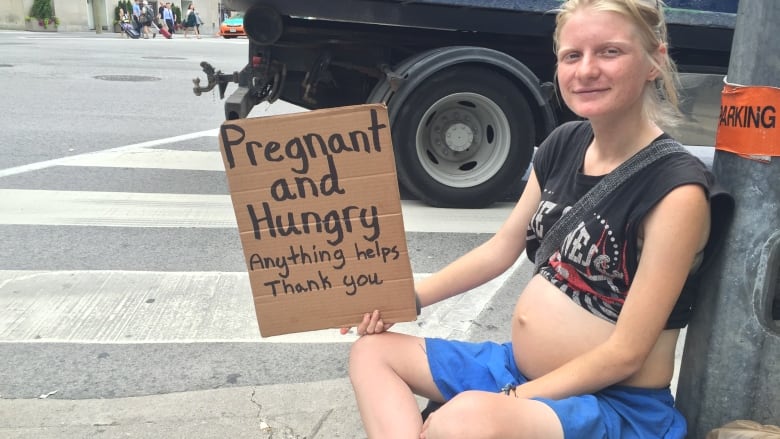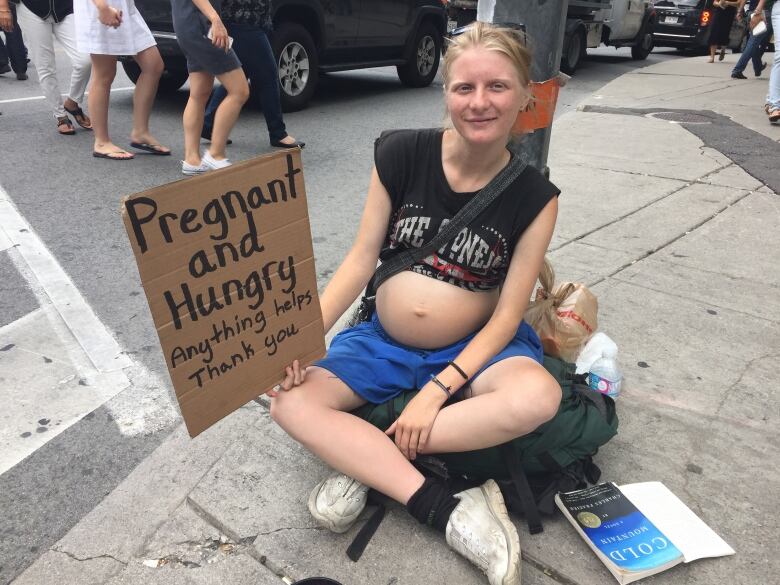Homeless and pregnant in Toronto: 1 woman tells her story
About 120 homeless women give birth in Toronto every year. The challenge is how to help them

Most nights, Amanda Watson, 21, sleeps with her partner on a hammock slung from trees somewhere along Toronto's waterfront.
Most days, she panhandles for a few hours outside Union Station, the city's downtown transportation hub,and then explores the city.
It's the routine for manypeople living on the streets in this city, exceptWatson is both homeless andpregnant.
"It's easy to be able to be like, 'I'm hungry' and just sit down for a couple of minutes and get something to eat, rather than trying to pick your whole life back up," she told CBC News.
For the most part,Torontoniansare generous, says Watson, whohasbeen pregnant for months, but doesn't know exactly when she is due.Many passersbyhave taken her out for a meal and given her some money. She says every little bit helps.
Only a small percentage of the 120 homelesswomen who will give birth in the city this year will end up keeping their babies, according to Toronto Public Health.The rest of the babies will be taken by child protection services, such as in the case of Watson, whose first-born was taken by child protection services.
Pregnancy andaftercare workerMichelleGahwiler, who is withthe Children's Aid Society of Toronto, says that legally,workers can't intervene until the birth. But Gahwiler saysshe often reaches out to homeless women to find out if they intend to keep their babies and if they want help finding housing or treatment opportunities. She says clients rarely go on to parent.
"We have a lot of success with placing babies with relatives or community members," she says."I have so many women who come back ... to thank me."
'They've been judged'
Cheryl Dillon is one of the nurses on a public health team withthe Homeless at Risk Prenatal (HARP) program, and istasked with keeping an eye on homeless pregnant women.
One of the biggest challenges, she says, is getting clients to see a doctor.
"A lot of times they've had bad experiences;they've been judged." That could be why Watson hasn't seen a doctor. She doesn't want to, she says.
There's stigmatization from the public as well.
HARP team manager Alice Gorman, who has been working with homeless pregnant women for more than two decades, says:"We've hada lot of different comments made to us... 'Why are these women getting pregnant?'"
She saysher team's goals are to provide the best possible tools for a healthy pregnancy, not to pass judgment.
A lot of the women have had histories of serious addictions, serious mental health issues that have never really been truly addressed.- Alice Gorman,Homeless at Risk Prenatal (HARP) program
Gorman says the numberof homeless women who go on to parentis increasing gradually, buther team is also seeingwomen with more complex health issues.
"A lot of the women have had histories of serious addictions, serious mental health issues that have never really been truly addressed," she says. "It's our job to make sure that they're getting the help they deserve."
One of the greatest rewards from her work,saysDillon, is seeing women turn their lives around during a pregnancy she hashadclients go on to keep their children,get an apartment and flourish at work.
"It's amazing to see some of the changes these women can [make] ...It doesn't always happen, but we always continue to carry that hope."
'I just need a little help'
Watsonwould like to keep her baby she's convinced it's a girl, like her first child but also knows she might lose her too.

After delivering her daughter around a yearandahalf ago, she says, a worker with child protection services took the child fromher. Eventually,Watson'smother, who lives in Ottawa, adoptedher daughter, says Watson. Sometimes they speak overSkype. But she hasn't been able to hold her since she was born.
Watson won't go back to Ottawa. She says she came to Toronto to start a new life after escaping a traumatic experience thatshe isn't comfortable sharing with the public. She says she wants to eventually find an apartment for her and her partner, become an auto mechanic and own her own shop.
"A lot of people go through a lot of stuff and not everybody can get out of situations as fast as other people would like them to," Watson said. "I'm not doing anything wrong. I just need a little bit of help."












_(720p).jpg)


 OFFICIAL HD MUSIC VIDEO.jpg)
.jpg)



























































































